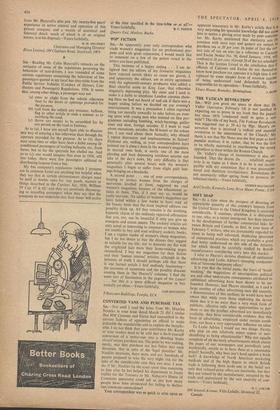CONVERTED VANS AND PURCHASE TAX SIR,—Not until I read the
letter from Mr. Maurice Nockles in your issue dated March 21 did I realise that HM Customs and Excise had succumbed to the current fashion of appointing an official to make palatable the unpalatable and to explain the inexplic- able. I do not think that your contributor Mr, Kerby or your readers need to be told that a do-it-yourself conversion of a motor-van into a shooting brake should attract purchase tax. The point he was making, surely, was that purchase tax has fallen into such disrepute, that in spite of the 'legal penalties' Mr. Nockles mentions, there were, and are, hundreds of people prepared to take the very slight risk for the sake of the considerable sum they can save. I won- der if Mr. Nockles (in the scant spare time remaining to him after he has helped his department to frame replies for the Treasury to Mr. Nabarro's House of Commons questions) could tell us just how many people have been prosecuted for failing to declare van/estate-car conversions?
Your correspondent was so quick to seize upon an apparent inaccuracy in Mr. Kerby's article that it is very surprising his specialist knowledge did not WO him to notice a glaring error made by your contribtr tor. Mr. Kerby mentioned that chemistry sets Ors common with most toys and games) are subject 10 purchase tax at 20 per cent. In point of fact the cor- rect rate of tax on toys (as a reference to Customs and Excise Notice No. 78, dated January, 1958, will confirm) is 30 per cent. (Group 20 of the tax schedule)• Thus is the layman forced to the conclusion that if officials of Customs and Excise do not themselves know how purchase tax operates it is high time it Was replaced by some simpler form of taxation capable of being understood (and defended) by those responsible for its operation.—Yours faithfully, Ebury House, Romsley, Birmingham J. HUNT






























 Previous page
Previous page